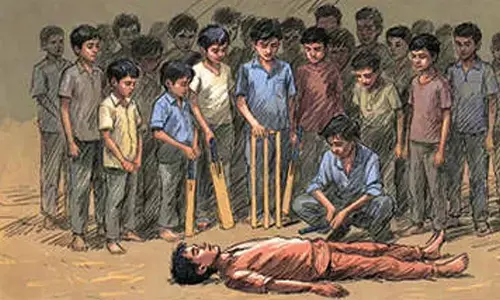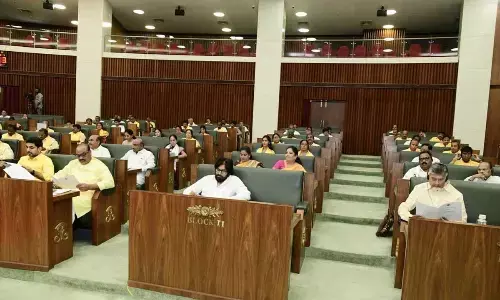And the winner is English

Some years ago, a renowned Indian academic stunned me during a casual dinner conversation. I was talking to her about my writings in Hindi as well as English.
Some years ago, a renowned Indian academic stunned me during a casual dinner conversation. I was talking to her about my writings in Hindi as well as English. Writing in Hindi was important for pedagogic reasons, she agreed. But she was shocked when I insisted that I write some of my articles originally in Hindi. Languages like Hindi and Tamil are good for street conversation. But surely you cannot do conceptual thinking in these languages, the way you can in English and French, she said.
That conversation has stayed with me, for it revealed in a flash something we all take for granted. She had said what our elites believe but do not say openly. Indian languages are believed to be inferior languages and those who express themselves principally in an Indian language are assumed to be inferior beings.
Like gender and race, inequality of language is so obvious and omnipresent that we take it for granted. Advertisements for English-speaking courses, ever mushrooming English medium public schools, everyone at social conversations trying to impress one another with their limited English, parents speaking to their children in rudimentary English. We see and experience it every day. But we dare not name this linguistic apartheid.
The language question lies at the heart of the current controversy about the civil services examination of the UPSC. Much of the debate in the English media distracts our attention away from this core issue.
The protest is not against an aptitude test per se, though some protesters seem to say so. All over the world, aptitude tests are a standard way of judging a candidate’s suitability for a job. You can dispute whether a particular aptitude test fits the bill, but not the very idea of an aptitude test. There can be a debate about the right mix of skills needed to be a civil servant. (My colleague, Manish Sisodia, thinks you need an attitude test – a test of social skills and emotional intelligence for this job.) But it would be hard to dispute certain basic analytical, linguistic and quantitative skills are a must.
Similarly, though there is something to the humanities versus science subjects dispute, this is not the heart of the matter. It is true that over the years, students with a background in engineering and management have come to do much better than others in the civil services examination. But then, medicine, engineering and management tend to draw a disproportionately bigger share of the talent pool of our school-leaving students. Science students may be more familiar with the format of the CSAT, but it is disingenuous to argue that tests of reasoning and quantitative skills are loaded in favour of engineers.
Finally, this protest is neither for Hindi nor against English. The protesters have gone out of their way to clarify that they are not making a special case for Hindi. Their point applies to all the Indian languages, or bhashas as U R Ananthamurthy would have it. The media, especially the English media, has simply not understood that someone could raise the language question without being either pro-Hindi or anti-English.
Thus, this agitation is not against English but against the dominance of English. It is against the presumption that the national talent resides within the tiny pool of English speakers. It is not for privileging Hindi but for providing a level-playing field for all Indian languages vis-a-vis English. Behind this seemingly innocuous and overblown dispute about the CSAT paper lies a deeper challenge to the informal system of linguistic apartheid in our country.
The real problem with the civil services examination is the insidious manner in which it privileges English. A test of aptitude can and should test linguistic skills, not language proficiency as it currently does. The level of English expected, Class X or higher, is beside the point. The relevant question is why linguistic ability is tested only through English and not any bhasha. This is why the complaint about the quality of translation in the CSAT question paper is not a small detail. It shows that this test is not designed to be language neutral. Model answer papers for general studies are available only in English and thus work against bhasha candidates. The interview process also works against those who are not fluent in English. The protesters are upset, and rightly so, about being treated as second-rate examinees.
Empirical evidence bears out this suspicion. Over three decades, the proportion of bhasha students had gone up, opening the doors of this elite service for students from non-elite backgrounds. The new system introduced in 2011 reversed this trend. The proportion of non-English medium students in the Main examination plummeted from 44 per cent in 2008-10 (three year average) to just 18 per cent in 2011-12. The proportion of Hindi medium students among the finally selected students is estimated to be just 3 per cent, down from 25 per cent in 2009.
The CSAT paper, and the civil services examination in general, is just the tip of the iceberg. The entire system of higher education that controls white collar jobs is loaded against bhasha medium students. More often than not, they need to switch overnight to the English medium to enter the best institutions in the country. Even if the institution formally permits one or more Indian language as the medium of examination, there are multiple informal barriers at each step: syllabi, prescribed books, classroom teaching, question papers and examiners are all biased in favour of English. Bhasha medium students are consigned to lower rung institutions or to the lower academic rung of the better institutions. They are made to swim against the current all the way. The agitation against the civil services examination is a protest against the entire system that is rigged against Indian languages.
This is why I celebrate and salute this agitation. If it can avoid distractions to focus on its core issue, refuse to be bought with sops like one additional chance for examination, and not fall prey to the machinations of the ruling party and its agents, it can perhaps mitigate the effects of our desi linguistic apartheid. This may well be our last chance.








